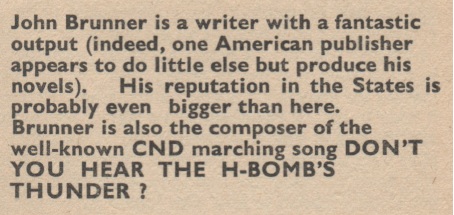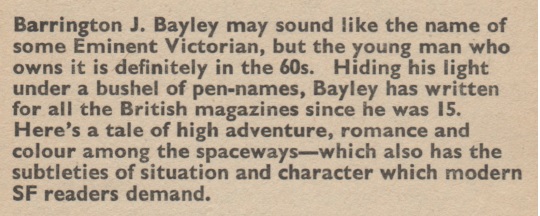
by Victoria Lucas
It Finally Came!
Just a wee plug. My favorite publisher is Faber & Faber. While I was wiping the drool from my face during a perusal of their last catalog, something caught my eye. An interesting book, of course, but this time not a playbook (my usual fare, when I can afford it): it was a novel by a popular British author, Edmund Cooper. If you saw “The Invisible Boy” (the movie), you saw a version of his The Brain Child, a book published the year before. But the novel I finally counted my pennies and bought long distance was Transit. The hype made it look delicious, and it had a February 1964 publication date. So it arrived at last from the Isles.

Cover art by Brian Rigby
Richard Avery/Edmund Cooper
One of the things I learned about Cooper when I looked him up was that he has a number of pseudonyms: George Kinley, Broderick Duain, Martin Lester, … and Richard Avery. On page one of Transit, in fact in sentence one I learned that the protagonist of this book is … Richard Avery. I don’t know what that means that he was putting himself in this book, but perhaps it indicates somehow that Avery and Cooper share opinions about things?
In the first part of the book we learn mainly about Richard, but as he suffers “transit” to another planet in this “sector” of the galaxy, he — and we — are introduced to Barbara, then to Mary. On the planet where Richard, Mary, and Barbara are marooned, we meet Tom, also late of London as well. They find themselves in a “predicament.”

Edmund Cooper
Predicament under Achernar
The planet is the fourth orbiting Achernar, a blue giant in a binary system. (The star is real; who knows about the planet.) The four strangers, already divided into two couples by the choices made by their kidnappers, find themselves on a beach of an island in a strange ocean, with just enough food to last them a single day, but with flashcards identifying useful and dangerous animals and plants, one gun and some ammunition for it, knives and hatchets, and general camping equipment, including tents. Some of their personal belongings have arrived with them, although they don’t yet know how or why.
The word “predicament” appears in this early characterization by the narrator, Richard: “The predicament … was, itself, neither clear nor sane.” Of course I looked up the word (as I always do when faced with any word that appears to be important or undefined). Partridge’s Origins, “a short etymological dictionary of modern English,” delves into the earliest prototypes of the word, taking it back to the Latin for “proclaim.” It is something proclaimed, thus circumstantial, and by extension unpleasant. One does not land in a predicament by one’s own power except by being in the wrong place at the wrong time. Each of the protagonists looked down to see a crystal gazing up at them in Kensington Gardens or Hyde Park. That was the wrong place at the wrong time that landed them on an island on another planet that had not heretofore been home to anything brighter than a crocodile-like creature.

From Kensington Gardens to The Garden
Like the garden populated only by Adam and Eve, this book concerns only four people (and some ghosts of the past haunting their brains) until close to halfway through the book, when unknown others make themselves known but not seen. Before they begin to impinge on the solitude enjoyed by Tom and Mary, Richard and Barbara, the four (but especially Richard) are occupied by trying to figure out what has happened to them and why. As they experience their first sunset under two moons, Richard considers the classic universe occupied by the 20th-century Christian, then continues, “But perhaps God had many children, and some of his children were adept at the manufacture of hypnotic crystals. And other things.”
At first Richard misses London; then, as they camp out on an island on which they are apparently abandoned, he has a “vision of the morning rush hour packed with victims for the City’s concentration camp.” Richard considers that he is having entirely too many visions, and thinks, “Maybe I’m in a lovely nut-house in London” just before the hears the gunshots that herald the end of their idyl. Instead of being ejected from a primeval garden by God, the two couples are rousted by what turn out to be another group of four dropped on the opposite shore of the island — but these are not humans.

Remaining Mum
To tell you any more about the plot would, I think, rob it of the elements of surprise on which Cooper depends to keep the story fresh. I will disclose that it is an optimistic tale despite Richard’s and the other characters’ speculations, sufferings, and hardships. Richard does speak of the “impossible unending promise of tomorrow,” and, particularly about their group, “the conspiracy of sex.” However, the really good thing about this book, aside from the quality of the writing, is the character development. Most formulaic stories, including detective, romance, and science fiction — all of which Cooper has written — have little to no character development. The people are often stock characters, Everyman or Everywoman, and they do not learn, change, or otherwise evolve during their stories. This book is enough about evolution, change, development that I think perhaps “transit” is not just meant in terms of physically going from one place to another, but more like its synonym “movement” or the definition “pass through,” or (from the original Latin) “go across.”
Richard and his companions pass through many states of mind, grow and become different from the people they were when they first saw the crystals. My criticisms below pale before this achievement.

The Demerits
You will be familiar with my first criticism. It’s about the way women are generally treated in SF–even by women authors. We are too helpless, too unintelligent, too timid to make our own decisions. When they are first on the island, both women assert that “somebody has to be responsible for us” (the group of 4) and “make the decisions.” Barbara adds, “A man.” Of course it is Richard, who, despite a probationary period, remains the group leader afterward. The women do learn to use weapons and to be responsible for themselves, but they do not make the decisions nor participate in them.
Second, the ending: I find it really unsatisfactory. Without revealing too much, I feel as if Cooper, whose eighth novel this was, reached a word count and decided that was enough. Perhaps he felt that with a wide-open future before his protagonists there was no need to expand further. I’m too practical for that. I want to know how their future could be accomplished with the tools they have, and I’m also pretty disappointed in the aliens who brought them to the garden. The very qualities that they appreciate in the humans are the ones they seem to lack themselves. Oh, well. I say go read the book and see what you think. I give it maybe 4 out of 5. Pretty good.
Parting Note
And now for a word about my own future. My own predicament is also “neither clear nor sane,” and I am doing the only thing I know to do about it, leaving for what I hope are greener pastures. Look for me next month in San Francisco.

[Come join us at Portal 55, Galactic Journey's real-time lounge! Talk about your favorite SFF, chat with the Traveler and co., relax, sit a spell…]

![[May 6, 1964] The Predicament: <i>Transit</i> by Edmund Cooper](https://i0.wp.com/galacticjourney.org/wordpress/wp-content/uploads/2019/05/640506transitamazon.jpg?resize=375%2C372)

![[May 4, 1964] A Matter of Proportion, Revisited](https://i0.wp.com/galacticjourney.org/wordpress/wp-content/uploads/2019/05/640504napdress2.jpg?resize=672%2C372)





![[May 2, 1964] The Big Time (May 1964 <i>Analog</i>)](https://i0.wp.com/galacticjourney.org/wordpress/wp-content/uploads/2019/05/640502cover.jpg?resize=672%2C372)








![[April 30, 1964] Mary Mary Quite Contrary: Mary Quant and the Modern Woman](https://i0.wp.com/galacticjourney.org/wordpress/wp-content/uploads/2019/04/640430a03.jpg?resize=672%2C372)








![[April 28, 1964] Out With the Old…. (<i>New Worlds, May-June 1964</i>)](https://i0.wp.com/galacticjourney.org/wordpress/wp-content/uploads/2019/04/640428cover.jpg?resize=555%2C372)








![[April 26th, 1964] The Start Of A Wild Ride (<i>Doctor Who</i>: The Keys of Marinus, parts 1 to 3)](https://i0.wp.com/galacticjourney.org/wordpress/wp-content/uploads/2019/04/640426ilovebarbara.jpg?resize=672%2C372)



















![[April 24, 1964] Some Justice to Mete Out (<i>The Twilight Zone</i>, Season 5, Episodes 25-28)](https://i0.wp.com/galacticjourney.org/wordpress/wp-content/uploads/2019/04/640424a.jpg?resize=672%2C372)






![[April 22, 1964] World Affairs (May 1964 <i>Fantastic</i>)](https://i0.wp.com/galacticjourney.org/wordpress/wp-content/uploads/2019/04/640422cover.jpg?resize=601%2C372)
















![[April 20, 1964] Play Ball! (June 1964 <i>Worlds of Tomorrow</i>)](https://i0.wp.com/galacticjourney.org/wordpress/wp-content/uploads/2019/04/640420cover.jpg?resize=672%2C372)







![[April 18, 1964] A firm line (the May 1964 <i>Fantasy and Science Fiction</i>)](https://i0.wp.com/galacticjourney.org/wordpress/wp-content/uploads/2019/04/640418cover-1.jpg?resize=672%2C372)



